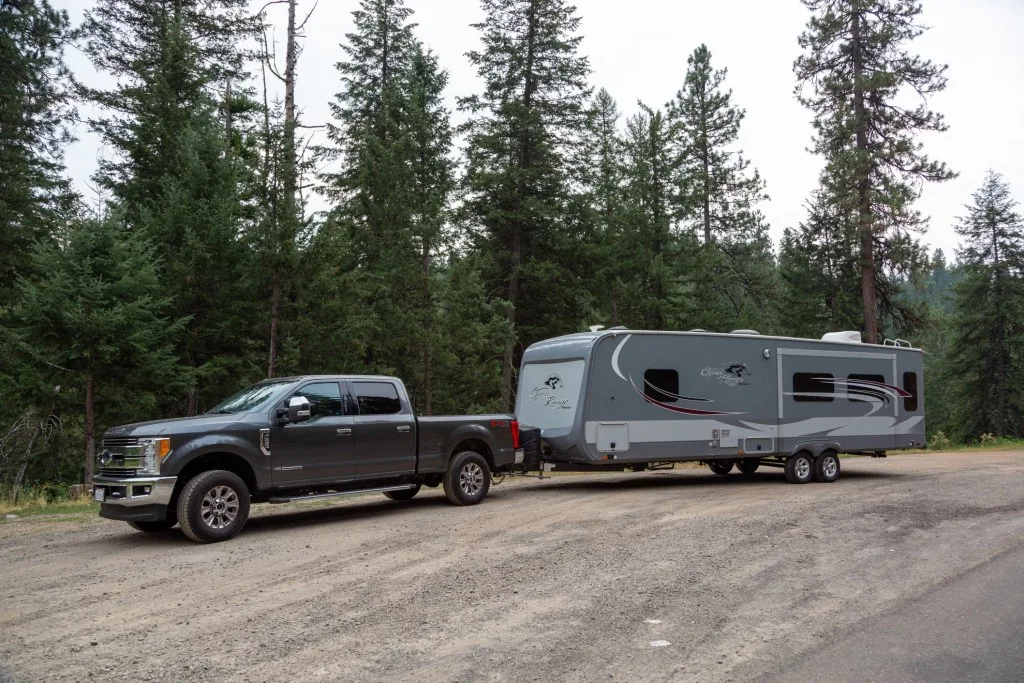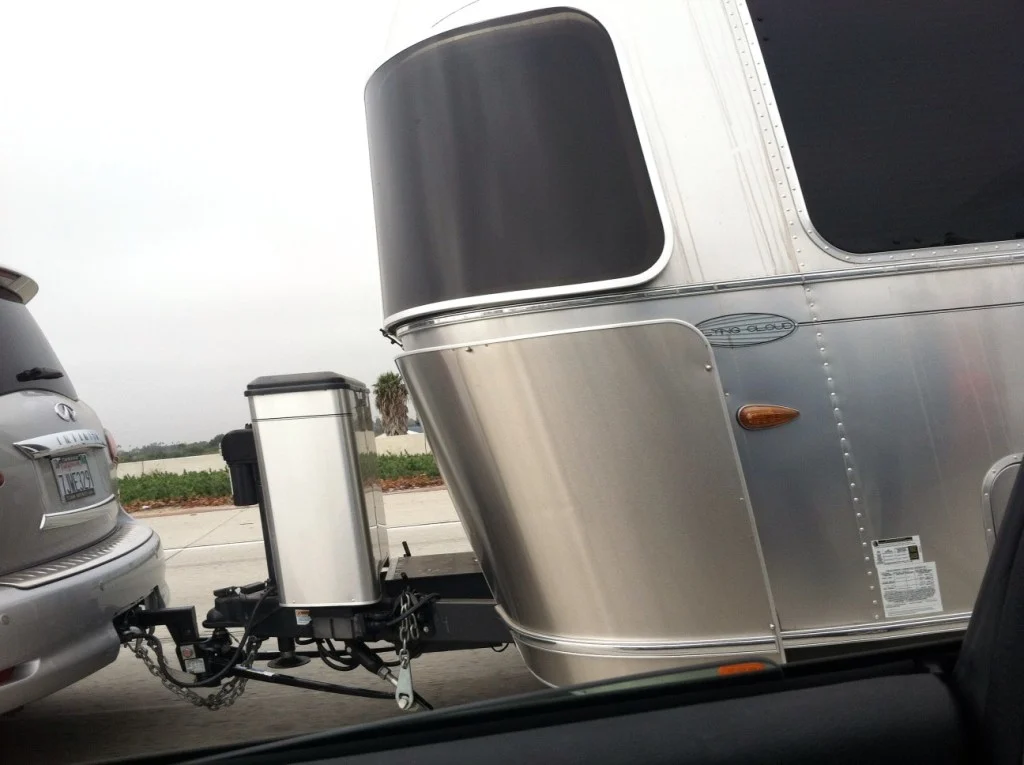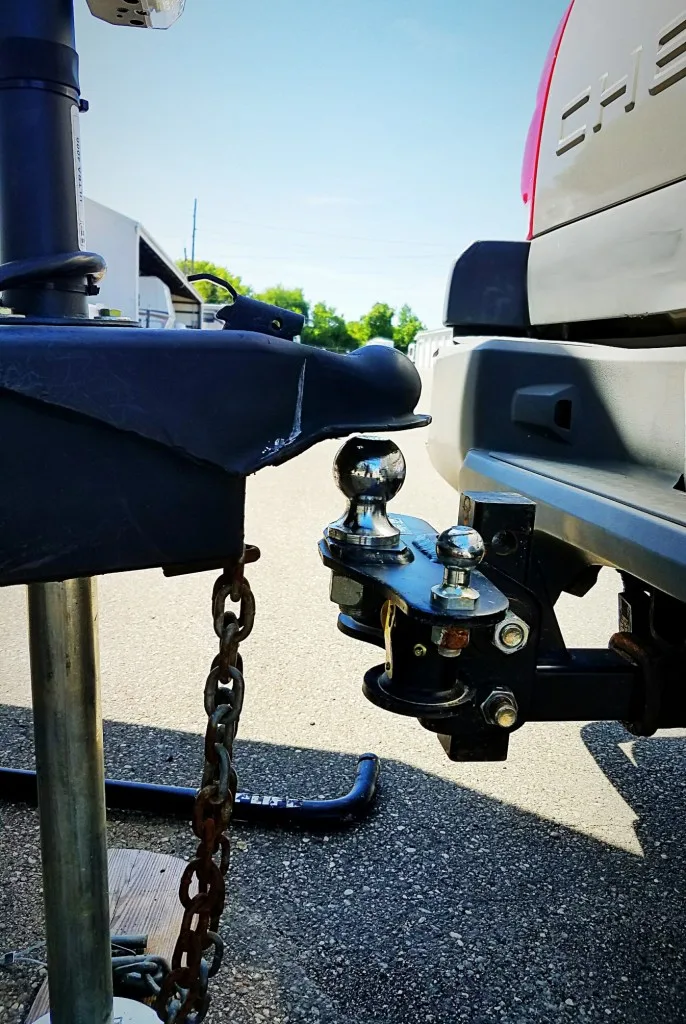Are Pull Behind RV Campers Dangerous?
Most of us have seen videos and pictures of trailers careening off the side of the highway, flipping the trailer, truck, and occupants until it comes to rest on its side.
It’s terrifying to think about.
If you have the right towing gear, the correct tow vehicle, and use common sense, towing can be safe and get you where you want to go.
However, the wrong set up can put you, your family, and your RV in danger.

What is a Pull Behind Camper?
A pull-behind camper is one that you pull behind another vehicle. Seems simple enough. The camper attaches to the vehicle, be it a truck or SUV, by a trailer hitch.
The hitch is located on the bumper or in the bed (like a 5th wheel) of you tow vehicle.
RV trailers can range from 10 feet to 40+ feet in length. The longer the trailer, the harder it is to pull and control without the correct equipment.
Pro Tip: Here are the best 3/4 ton trucks for towing.

Are Pull Behind Campers Dangerous?
RV campers themselves are not dangerous. However, when combined with a towing vehicle that does not have enough tow capacity or the right hitch, they can be extremely dangerous.
Too much speed, weight, or wind can all lead to scary situations.
Knowing the dangers upfront will help take away some of the anxiety of towing and make sure you arrive safely.

Travel Trailer Dangers
Sway danger and what causes it.
Sway is when the vehicle reaches a certain speed and the trailer attached starts to move back and forth across the road.
When this happens, many driving professionals say you should take your foot off the gas and not hit the brake. Let the car slow naturally. It is recommended to keep your speed under 55 miles per hour.
A likely reason for the sway is packing more weight in the rear of the trailer than the front.
It starts to act like when you’re on a ride at the fair. As it whips you around, both people get pushed to the outside. The heavier you are the harder you push out. This can cause an RV to fly off the road.
There are three weights you should know or figure out before towing.
One is the Gross Vehicle Weight of the trailer. How much does the empty trailer weigh and how much stuff are you’re putting in it?
How much weight can your tow vehicle tow?
That will depend on the car or truck you drive. It will tell you in the owner’s manual, then add in the weight of your passengers to see how much more you can tow behind the vehicle.
The final weight to know is how much weight a trailer hitch can have on it. If there is too much, there is a danger of the hitch not holding and steering will be much more difficult.
Hitch dangers
When hooking up a trailer to a hitch, make sure it’s the right hitch and towing vehicle for the weight of the trailer. Use the correct hitch ball on the towing truck that the trailer fits perfectly.
Know how much force (weight) is being exerted on the trailer ball. The pressure should be between 10 to 15 percent of the gross trailer weight. If the trailer weighs 15,000 pounds, the tongue weight would be between 1,500 and 2,250 pounds. If it’s more than that, then there could be a problem.
There are three types of hitches trailer owner’s use.

A receiver hitch. Most trucks come with the metal, square tube attached to the back of the truck. There are different classes of these hitches. They can tow from 2,000 pounds for a Class 1 hitch up to 12,000 pounds for a Class 5 hitch.
Bumper mounted hitch. This hitch is attached to the bumper, not part of the truck itself. It is limited by what the bumper can withstand.
Weight distribution hitch. This type of hitch is mounted to the receiver hitch and has two spring rods that help to distribute the weight between the truck and the trailer. It commonly is used on campers, and helps with steering and keeping the back of the truck from sagging.
How to Safely Tow a Travel Trailer
You can safely tow a trailer by knowing all of the facts first. Make sure your vehicle has the towing capacity for everyone in it, and everything in the trailer as well as the trailer itself.
Know what to do when or if your trailer starts to sway…don’t slam the brakes, allow the vehicle to slow naturally, and drive conservatively when it comes to speed.
When packing your rig, have most of the weight at least 60 percent in the front, near the hitch of the trailer. This will help prevent sway. If you have a weight distribution hitch, this will provide more stability and weight management for the unit as it travels down the road.
Practice hooking up and unhooking the trailer at home to make sure you can do it, for starters, and to create a checklist so you don’t skip steps like attaching the chains.
So Is An RV Trailer Dangerous? Not Intrinsically.
Be prepared. Give everyone a job and make sure you check off everything that should be done before towing.
You’ll drive safer and with more confidence when you follow some of these simple, but crucial tips. We don’t want you to end up on social media or on TV because of an unfortunate, preventable accident.
Towing doesn’t have to be scary if you take precautions.
Advanced RVers: Here’s an in-depth look at the differences between towable and drivable RVs.

Discover the Best Free Camping Across the USA
To be honest with you, we hate paying for camping. There are so many free campsites in America (with complete privacy).
You should give it a try!
As a matter of fact, these free campsites are yours. Every time you pay federal taxes, you’re contributing to these lands.
Become a FREE CAMPING INSIDER and join the 100,000 campers that love to score the best site!
We’ll send you the 50 Best Free Campsites in the USA (one per state). Access the list by submitting your email below:
Be sure to rent a small U-Haul towable first and learn how to back it up. The smaller the trailer, the more difficult it is to maneuver, as it responds quicker to the slightest turn of your steering wheel.
Once you have mastered the little U-Haul, then larger trailers are a breeze. Still this article does a fine job of pointing out things you must also learn like weight distribution (how to pack the trailer), and emergency situations (not braking). ❤️🦋🌀
If your trailer is level when towing it you are going to have proper weight distribution on all tires and that will also help with sway and control issues.